|
|
|
Sort Order |
|
|
|
Items / Page
|
|
|
|
|
|
|
| Srl | Item |
| 1 |
ID:
134127


|
|
|
|
|
| Publication |
2014.
|
| Summary/Abstract |
This article examines the problems of integrating the Central Asian states into the transportation and communication sphere, as well as the factors influencing this process. It analyzes the trends in building alternative transportation corridors and reveals their development advantages and prospects. It presents a comparative year-by-year analysis of the changes in the interdependence of the transportation sectors of the region's states.
|
|
|
|
|
|
|
|
|
|
|
|
|
|
|
|
| 2 |
ID:
134116
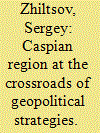

|
|
|
|
|
| Publication |
2014.
|
| Summary/Abstract |
The author concentrates on the geopolitical games in the Caspian region and identifies the factors that have remained prominent in the last twenty years and, in fact, determined the developments in this part of the world, viz. oil and gas reserves, the scope of their industrial production, and the recently built export pipelines as geopolitical instruments of the Caspian states and extra-regional players.
He analyzes the geopolitical aims of Russia, the European Union, the U.S., and China, the key players responsible for the Caspian geopolitical context, to conclude that the region's geopolitical, social, economic, and political future, as well as its interstate relations largely depend on the pace at which oil and gas is produced and pipeline projects implemented
|
|
|
|
|
|
|
|
|
|
|
|
|
|
|
|
| 3 |
ID:
134123
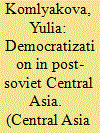

|
|
|
|
|
| Publication |
2014.
|
| Summary/Abstract |
The author analyzes how the Central Asian countries (Kazakhstan, Uzbekistan, and Kyrgyzstan) are moving toward democracy, as well as the political and geopolitical reasons behind the United States' interest in the region triggered by the Soviet Union's disintegration and Washington's desire to consolidate its position in the post-Soviet space. It was determined to realize its interests by planting democratic values in the newly independent states and urging them to orientate themselves toward democratic principles when shaping their policies. In this way, the Central Asian countries could count on Washington's political support and economic aid.
In an effort to enter the world scene as democratic states, the Central Asian countries built state structures that relied on constitutions describing them as democratic states; they created a party and election system and passed laws on the freedom of speech, glasnost, etc. This, however, has not transformed the post-Soviet Central Asian republics into paragons of democracy: the clan system is very much alive in the corridors of power; Soviet mentality remains predominant among state officials (practically all the top figures preserved their posts in the newly independent states); and the influence of Russia and the authoritarian traditions inherited from the past is still very obvious.
|
|
|
|
|
|
|
|
|
|
|
|
|
|
|
|
| 4 |
ID:
134115
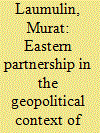

|
|
|
|
|
| Publication |
2014.
|
| Summary/Abstract |
The Eastern Partnership (EP) program should be viewed as another attempt to reformat the post-Soviet space along anti-Russian and anti-Eurasian lines and a response to Moscow's integration activities. This is not the first attempt of its kind: the West has already tried other geopolitical and geoeconomic tools. The final aim, however, has remained the same: Russia's domination and possible integration of post-Soviet regions irrespective of form, even economically adequate, should be prevented by all means.
|
|
|
|
|
|
|
|
|
|
|
|
|
|
|
|
| 5 |
ID:
134128
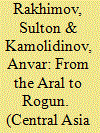

|
|
|
|
|
| Publication |
2014.
|
| Summary/Abstract |
Recently, the problems related to water usage in the Central Asia Region have not left the pages of the media and Internet websites. Particular attention is being focused on the most urgent topic-building hydropower stations on the upper reaches of the Amu Darya and Syr Darya rivers, which are the region's main water arteries.
This article presents an analysis of the water situation in the Amu Darya Basin, including the reasons for the shrinkage of the Aral Sea. It draws a picture of how water resources form, are distributed, and used in the Amu Darya Basin, and gives probable forecasts of the potential positive and negative consequences of building the Rogun Hydropower Plant, keeping in mind the influence of the current global challenges and threats for the region. It draws attention to the weak regional cooperation and the possible development of negative trends caused by limited integration. The difficulties associated with stable water supply to the region's countries can only be avoided by establishing cooperation among them
|
|
|
|
|
|
|
|
|
|
|
|
|
|
|
|
| 6 |
ID:
134119
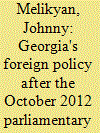

|
|
|
|
|
| Publication |
2014.
|
| Summary/Abstract |
The author looks at the key foreign policy trends and changes that became obvious after the parliamentary elections of October 2012.
The article's first part describes Georgia's foreign policy under President Saakashvili when Georgia received its first conceptual documents-the National Security Concept and the Military Doctrine-both geared toward Europe and the closest possible cooperation with NATO, revised regional relations, and a new agenda.
The second part deals with the changes in Georgia's foreign policy that took place after the presidential elections of 1 October, 2012, when the opposition Georgian Dream Coalition won the majority of seats in the Georgian parliament and the post of prime minister for its leader, Bidzina Ivanishvili. The newly emerging relations between Georgia and Russia and the efforts of the Georgian leaders to resume their dialog with Moscow are also analyzed.
The concluding part offers an overview of Georgia's relations with the European structures, its progress toward an association with the European Union, the course of the talks, and the way this association will affect the main spheres of the country's life.
|
|
|
|
|
|
|
|
|
|
|
|
|
|
|
|
| 7 |
ID:
134114
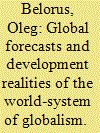

|
|
|
|
|
| Publication |
2014.
|
| Summary/Abstract |
is shaping the destiny of every country in the world.
Today, long-term forecasts of global development for the next 25 and 50 years rely on strictly imperative norms; the "breakthrough into the future" scenarios should proceed from the actual unity of the world and take into account the transition-transformation nature of its development.
Global transformation has no end; the social and economic convergence of countries with different levels and characteristics of development is a new phenomenon that calls for in-depth political and economic study. The expert community has already concluded that recurring crises of overproduction will alternate with non-cyclical crises of overconsumption of resources, while the accompanying new technologies of social production and economic relations will become even more dynamic.
|
|
|
|
|
|
|
|
|
|
|
|
|
|
|
|
| 8 |
ID:
134125
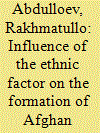

|
|
|
|
|
| Publication |
2014.
|
| Summary/Abstract |
The formation of a unified state in Afghanistan is deeply affected by the many ethnic contradictions that are greatly hindering its current development. They primarily relate to building a multiethnic state, the traditional domination of the Pashtun feudal elite in the power structures, the place and role of the non-Afghan peoples in the country's economic and political life, and the relations among the main ethnic groups that populate the country.
This article examines the sources of these ethnic problems as the centralized state completed its formation in Afghanistan and how they are expressed in the country's current historical mythology.
|
|
|
|
|
|
|
|
|
|
|
|
|
|
|
|
| 9 |
ID:
134124
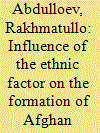

|
|
|
|
|
| Summary/Abstract |
The formation of a unified state in Afghanistan is deeply affected by the many ethnic contradictions that are greatly hindering its current development. They primarily relate to building a multiethnic state, the traditional domination of the Pashtun feudal elite in the power structures, the place and role of the non-Afghan peoples in the country's economic and political life, and the relations among the main ethnic groups that populate the country.
This article examines the sources of these ethnic problems as the centralized state completed its formation in Afghanistan and how they are expressed in the country's current historical mythology.
|
|
|
|
|
|
|
|
|
|
|
|
|
|
|
|
| 10 |
ID:
134121


|
|
|
|
|
| Publication |
2014.
|
| Summary/Abstract |
The author surveys the Islamic education system in Kyrgyzstan after the republic gained its independence, assesses its current state and the problems relating to this sphere, and offers her recommendations on how to upgrade its efficiency.
|
|
|
|
|
|
|
|
|
|
|
|
|
|
|
|
| 11 |
ID:
134118


|
|
|
|
|
| Publication |
2014.
|
| Summary/Abstract |
The military intervention in Afghanistan following the 9/11 attacks of al-Qa'eda terrorists provided an opportunity for U.S. politicians to materialize their long-awaited dream of the monopolar world predicted by scholars like Fukuyama after the collapse of the Soviet Union and the end of the bipolar world. Fukuyama, among others, believed that American liberal thought would be universally accepted and this would eventually lead to U.S. global domination.
The attitude of al-Qa'eda and the Taliban, on the one hand, and Afghanistan's strategic position, on the other, were not what U.S. officials needed for this purpose. However, Afghanistan could be used as an instrument to put pressure on Russia, Iran, China, and India. The Taliban's deplorable abuse of basic human rights, women, and narcotic drugs, etc. could justify the U.S.'s presence as a defender of human rights.
Although Afghanistan was invaded in 2001, and despite primary victories, the war is still going on more than 13 years later, and intervention is still continuing despite the change in U.S. administration. As a consequence of this occupation, the new geopolitics of this region are emerging with the presence of NATO forces, the continuing war, the incompletely suppressed Taliban forces, and the increase in insecurity for Iran and Pakistan. While at the same time, the Afghan mujahidin forces are being replaced by technocrats.
|
|
|
|
|
|
|
|
|
|
|
|
|
|
|
|
| 12 |
ID:
134129


|
|
|
|
|
| Publication |
2014.
|
| Summary/Abstract |
This article examines the contemporary press environment and existing research on the press-including the role of new media in Armenia, Azerbaijan, and Georgia. In the early 1990s, these successor states emerged from the dismantled Soviet empire to form new governments, press systems, and other national institutions. Each was nominally committed to developing free enterprise-based economies and democratic governance. The article discusses the press after they became part of the U.S.S.R., critiques the three national press environments, and examines how rapid expansion of social media use is blurring traditional definitions of journalism. Last, it concludes that significant obstacles remain to development of functional, effective press systems that can maintain economic and political autonomy and plurality in the South Caucasus.
|
|
|
|
|
|
|
|
|
|
|
|
|
|
|
|
| 13 |
ID:
134120
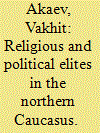

|
|
|
|
|
| Publication |
2014.
|
| Summary/Abstract |
This article highlights the main factors relating to the formation of the religious and political (Islamic) elites in the Northern Caucasus caused by Gorbachev's perestroika, the collapse of the Soviet Union, the reforms conducted in Russia, the creation of an ideological vacuum, and the birth of market relations. The sociocultural context that formed has given rise to an Islamic revival, the penetration of Salafi (Wahhabi) ideas into the region, and the formation of a neo-clergy that is not only claiming a leading role in the religious life of Muslims, but also active participation in politics, right down to preparing a state coup.
|
|
|
|
|
|
|
|
|
|
|
|
|
|
|
|
| 14 |
ID:
134117
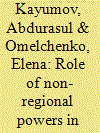

|
|
|
|
|
| Publication |
2014.
|
| Summary/Abstract |
Water as the least regulated issue is currently one of the key security factors in Central Asia. Although some efforts are made to regulate water through the establishment of a regional water regime, yet it remains unresolved. It has been stated that the involvement of international actors can have a positive effect on the solution of the problem. The analysis in this article shows that non-regional powers do not necessarily play a positive role in Central Asia. The water and energy nexus is often used by external powers as a geopolitical tool to influence regional countries for own political and economic interests.
|
|
|
|
|
|
|
|
|
|
|
|
|
|
|
|
| 15 |
ID:
134122
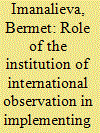

|
|
|
|
|
| Publication |
2014.
|
| Summary/Abstract |
This article examines the legal foundations and methodology of the activity of international observers who are following the preparations for and holding of elections. It studies the international obligations in keeping with which the election system of the Kyrgyz Republic is developing. It carries out a comparative analysis of the participation of international observers in the Kyrgyz Republic presidential elections held in 2009 and 2011. The article also presents a brief review of the recommendations for Kyrgyzstan to carry out its international obligations in the election system given by such organizations as the OSCE Office for Democratic Institutions and Human Rights and the CIS Observer Mission.
|
|
|
|
|
|
|
|
|
|
|
|
|
|
|
|
| 16 |
ID:
134126
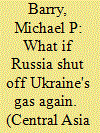

|
|
|
|
|
| Publication |
2014.
|
| Summary/Abstract |
This paper asks the question: what would happen to the economies of the world should Russia completely shut off natural gas shipments to the Ukraine. Significant findings of this model include the following:
The impact of the gas shutoff is overwhelmingly concentrated in Ukraine and Russia, whose economies would suffer GDP declines of 2.47 percent and 2.16 percent, respectively. Perhaps surprisingly, the model suggests Eastern Europe would experience only a small decline in GDP (0.13 percent) and Western Europe's GDP would be unaffected. The GDP of gas-pruducing republics of the Other Former Soviet Union (FSU), major gas suppliers through the Russian pipelines, would decline by 0.75 percent.
While the impacts to overall GDP are possibly smaller than expected, effects to individual industry sectors in many countries are quite large. One response of Ukraine and Europe to the cessation of Russian gas is an attempt to replace supplies with domestically-produced gas. While output of natural gas decreases by 4.86 percent in Russia and 11.6 percent in the Rest of the Former Soviet Union, gas production increases in Ukraine, Eastern Europe, and Western Europe by 140.1 percent, 88.1 percent, and 12.0 percent, respectively (though note that each region starts with a small base). Production of natural gas increases in Africa (6.9 percent), the Middle East (5.2 percent), the United States (2.0 percent), and the Rest of the World (2.2 percent).
|
|
|
|
|
|
|
|
|
|
|
|
|
|
|
|
|
|
|
|
|